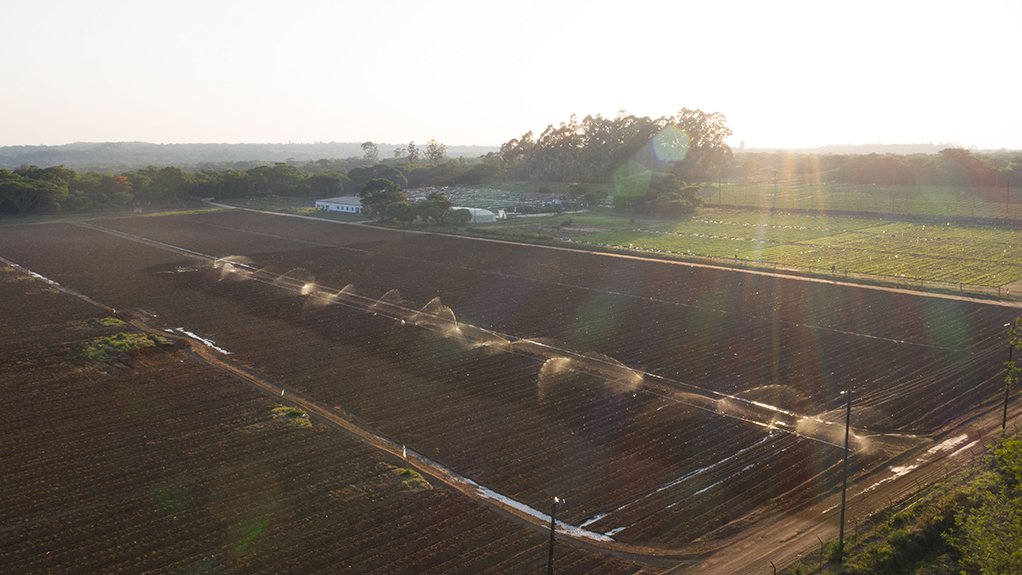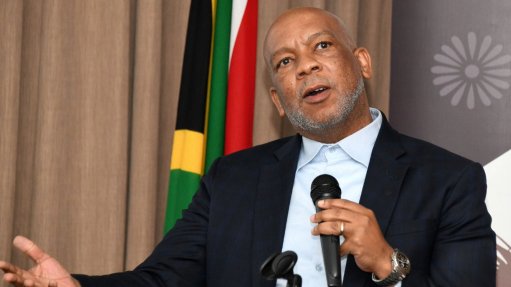Sun Exchange launches first of three crowd sales for 1.9 MW solar project in Zim
Peer-to-peer solar leasing platform Sun Exchange has launched a crowd sale for Phase 1 of a multiphase 1.9 MW solar and storage project for fresh produce exporter Nhimbe Fresh, in Zimbabwe.
This will be the largest Sun Exchange solar installation to date and the first outside of South Africa.
The project also marks the first that Sun Exchange will roll out in stages, owing to its size.
Sun Exchange CEO and founder Abe Cambridge explains that the staged process ensures the company is able to offer its global community of prospective solar cell owners the option to buy into three different crowd sales.
In addition, it means that once the phase for one crowd sale has been completed, the installation company Sun Exchange is contracting with, will be able to immediately install the project for that phase.
This ensures that Nhimbe Fresh starts generating solar power more quickly than if Sun Exchange waited to complete the crowd sale for one large solar project.
The project also marks the first one for Sun Exchange that involves crossborder leases, with the Nhimbe Fresh contracting entity based in Botswana.
Cambridge notes that the Sun Exchange development team also had to update its platform because, unlike other projects that depend on the kilowatt-hours used by the energy consumer, the earnings by solar cell owners for this project are fixed and in dollars.
In practice, this means that prospective solar cell owners can buy solar cells in dollars and earn income in rand or Bitcoin as usual. Sun Exchange is considering including other currency options in future.
The multiphase solar and battery project will power Nhimbe Fresh’s packhouse and cold store facilities in Phase 1, its pump sites in Phase 2 and Churchill Farm in Phase 3.
Once all three of the project phases have been completed, the solar projects can eliminate Nhimbe Fresh’s dependence on the national grid, which means that the entire operation can be islanded from the grid and reduce the risk of power cuts or load-shedding, while reducing the company’s reliance on dirty and expensive coal-based energy or diesel.
The solar plants will, however, be integrated with the existing system of on-site diesel generators to ensure further power reliability at all times for the operation.
Cambridge anticipates that Nhimbe Fresh will save hundreds of thousands of dollars a year in lost revenue owing to power cuts and its resultant lower yields, as well as save on operating overheads owing to lower reliance on diesel.
“Power outages have a major impact on Nhimbe Fresh’s production and processing, as the company is not able to irrigate when needed, which affects crop quality and yield. They also cannot keep produce fresh in their packhouses, which results in more losses,” he adds.
Sun Exchange anticipates that the solar power will cut the fruit exporter’s energy costs by more than 60% a year and carbon emissions by more than one-million kilograms a year.
Working with United Exports, Czon and Global Fresh, Nhimbe Fresh exports blueberries, raspberries, strawberries, stone fruit, snap peas and snow peas to major international grocery retailers.
Agriculture accounts for about 23% of sub-Saharan African gross domestic product and yet this critical sector faces immense challenges of unreliable power supply, rising electricity costs and limited access to finance for clean energy.
MODERN FINANCING
Through its online platform, Sun Exchange sells solar cells to its global community of more than 19 000 members across 168 countries, and then leases the cells to schools, businesses and other organisations in sub-Saharan Africa.
Solar cell owners offset their carbon footprint while earning a rental income stream from the clean electricity generated. In turn, businesses can go solar at no upfront cost, minimising their energy costs and climate impact.
As a first step, Sun Exchange identifies businesses and organisations that want to go solar. Sun Exchange solar engineers then work with local construction partners to evaluate proposed solar projects’ economic and technical viability, as well as social and environmental responsibility.
Once solar projects are accepted, Sun Exchange hosts online crowd sales of the solar cells in the project through its buy-to-lease solar marketplace.
Any individual or organisation, anywhere in the world, can sign up to be a Sun Exchange member and buy these solar cells for as little as R50 or $5 a cell in a matter of minutes.
Once all cells are bought, the solar project is installed and fully insured for fire, theft and damage for the lease term of 20 years.
The business or organisation where the solar cells are installed (the offtaker) pays for using them at a pre-agreed price per kilowatt-hour.
Solar cell owners receive this predictable and inflation-adjusted income for 20 years, paid in either local currency or in Bitcoin, all through a convenient dashboard complete with digital wallets.
Net of servicing, maintenance and operating costs, this income stream is equivalent to a 10% to 12% internal rate of return (IRR).
The energy consumer pays no installation costs, insurance or ongoing operational costs − these are all covered by Sun Exchange. This results in an immediate energy cost reduction of at least 20%, and average savings of over 40% over the full 20-year lease term.
The total value of the solar financing that will be raised for the Nhimbe Fresh project is $5.33-million. Over 180 000 solar cells will be available for purchase at about $7 each.
In the case of Nhimbe Fresh, the solar system is owned by the hundreds or perhaps thousands of individuals from around the world who buy solar cells in the three crowd sales Sun Exchange will be hosting on its platform.
Nhimbe Fresh will not own the system but will lease the solar plant from solar cell owners at a fixed monthly price, adjusted annually for inflation, for a period of 20 years.
“As for our other projects, the Sun Exchange platform will manage and administer the micro-leasing aspect of the project, creating thousands of microleases between solar cells owners – even those who own only one cell – and Nhimbe Fresh.
“To mitigate the risk of currency fluctuations, Sun Exchange will lease solar cells to Nhimbe at a fixed dollar price, and ensure a 12.3% IRR for solar cell owners,” Cambridge points out.
He says the 12.3% IRR is for those who buy solar cells in dollars. For those who buy cells in rand, the IRR is over 15%.
Cambridge adds that the IRR for this project is higher because the price that Nhimbe Fresh will pay for the power they consume will be fixed, and pegged to the dollar.
Also, because the lease is in dollars, which is a stable currency, the value of the rental income from solar cells will remain stable.
For instance, individuals who buy cells with rands will earn their income in rand or Bitcoin, whichever they prefer, while their earnings are fixed in dollars − this results in a higher IRR for these individuals.
“We expect higher participation in this crowd sale because the project leases are dollar-linked, which reduces solar cell owners’ exposure to currency risks.
“As mentioned, cell owners receive a fixed monthly rate for their solar cells and earn in dollars, which increases the forecast ability of earnings. In addition, because the system will be isolated, it will be immune to load-shedding, and therefore solar cell owners’ incomes will not be affected.”
Comments
Press Office
Announcements
What's On
Subscribe to improve your user experience...
Option 1 (equivalent of R125 a month):
Receive a weekly copy of Creamer Media's Engineering News & Mining Weekly magazine
(print copy for those in South Africa and e-magazine for those outside of South Africa)
Receive daily email newsletters
Access to full search results
Access archive of magazine back copies
Access to Projects in Progress
Access to ONE Research Report of your choice in PDF format
Option 2 (equivalent of R375 a month):
All benefits from Option 1
PLUS
Access to Creamer Media's Research Channel Africa for ALL Research Reports, in PDF format, on various industrial and mining sectors
including Electricity; Water; Energy Transition; Hydrogen; Roads, Rail and Ports; Coal; Gold; Platinum; Battery Metals; etc.
Already a subscriber?
Forgotten your password?
Receive weekly copy of Creamer Media's Engineering News & Mining Weekly magazine (print copy for those in South Africa and e-magazine for those outside of South Africa)
➕
Recieve daily email newsletters
➕
Access to full search results
➕
Access archive of magazine back copies
➕
Access to Projects in Progress
➕
Access to ONE Research Report of your choice in PDF format
RESEARCH CHANNEL AFRICA
R4500 (equivalent of R375 a month)
SUBSCRIBEAll benefits from Option 1
➕
Access to Creamer Media's Research Channel Africa for ALL Research Reports on various industrial and mining sectors, in PDF format, including on:
Electricity
➕
Water
➕
Energy Transition
➕
Hydrogen
➕
Roads, Rail and Ports
➕
Coal
➕
Gold
➕
Platinum
➕
Battery Metals
➕
etc.
Receive all benefits from Option 1 or Option 2 delivered to numerous people at your company
➕
Multiple User names and Passwords for simultaneous log-ins
➕
Intranet integration access to all in your organisation























